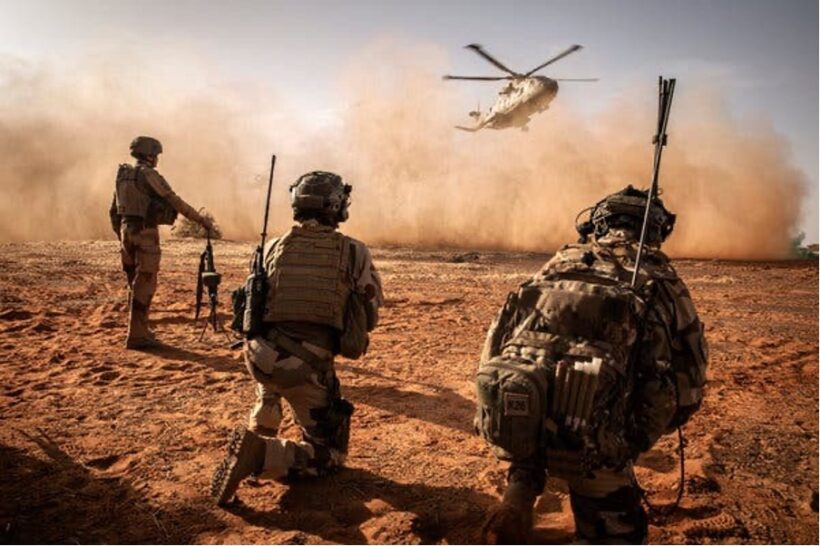Disclaimer: This post reflects solely the opinion of the authors and should not be taken to represent the general views of IPPR’s management/ editorial team or those of fellow authors
After nine years of counter-terrorist military operations in the Sahel, President Emmanuel Macron announced the return home of French troops in February 2022. But the terrorist threat is looming over the region more than ever. If he stayed, the decision would have been unpopular with his electorate and abusive to Malians. By leaving, he’s risking African and European security.
Source: The New York Times
With interventionism in Africa unpopular with the majority of voters and costing a whopping $797 million a year, maintaining forces on the ground was undoubtedly costly. So why did France do it to begin with?
Where it all started – the return of the colonisers
Following Islamists’ threat to overthrow Mali’s central government in 2012, the United Nations (UN) authorised a Security Council resolution allowing French intervention. While welcoming back the military of their previous colonisers may seem questionable, Operation Serval commenced at Mali’s initiative due to its limited capabilities to manage armed militias. Operation Serval was deemed a short-term resounding success and ended in July 2014, 18 months after its initiation.
With terrorist groups (including ISIS, Al Qaeda and Boko Haram) gaining traction in the region, the G5 Sahel countries (Mauritania, Mali, Niger, Chad, and Burkina Faso) invited the French to continue tackling the terrorist threat. This marked the beginning of Operation Barkhane.
This time, Europeans were not planning on leaving so soon. With the declared aim of training the armies of the G5 Sahel countries, French troops are still on the ground, along with other EU and UN missions for peacekeeping and humanitarian aid. Except now, they are preparing to leave.
Source: BBC
“The guarantee of perpetual peace does not rest on ethical conduct, but on devils, as long as they possess understanding”
It’s a tale as old as time. Are Westerners the preservers of peace and fighters against terrorism or merely self-interested? In this case, probably both.
Arguably, a strong incentive for Europe’s interest in African affairs is its own security. With the region right on Europe’s doorstep and the recent memory of the 2015 refugee crisis, European leaders have all the reasons to prevent a terrorist catastrophe. To the investment-banker-turned-president Emmanuel Macron, the large number of French corporations operating in the Sahel must not be a deterrent either.
This situation echoes Kant’s maxim: “the guarantee of perpetual peace does not rest on ethical conduct, but on devils, as long as they possess understanding”. But what happens when the devils stop cooperating?
Pulling out of the Sahel – Afghanistan 2.0?
Seemingly crumbling under the political pressure of the opposing public opinion, Macron announced the end of the French-led Operation Barkhane in February 2021. At the time, this changed very little. French presence was hardly diminished. Instead, it was absorbed into a wider European mission in the Sahel.
In light of the February 2022 European-African summit in Brussels, Macron once again announced the removal of French troops from Mali. This time it seems like his declarations weren’t just lip service. So why the pivot?
While French troops were initially welcomed with open arms, relations have severely deteriorated. With the number of terror attacks skyrocketing, Malians perceive the former colonial power as an “occupation” ineffective in keeping them safe. As for the French, support has been at an all-time low after 55 soldiers were killed in the region and the costs of war added to an already economically challenging post-Covid period.
Moreover, the French government is not particularly fond of Mali’s new ruling junta following the 2020 coup that ousted the civilian government. Neither does it appreciate the Malian government’s decision to hire Russian mercenaries to fight terrorists considering the ongoing war in Ukraine.
Mr Macron declared in February that “Victory against terror is not possible if it’s not supported by the state itself”. In the attempt to choose the lesser evil between being perceived as an occupational neo-imperialist and protecting a region in dire need of anti-terrorist know-how, Mr Macron chose the latter. But so did Joe Biden in Afghanistan.
Mr Macron may “completely” reject the idea of failure, but the reality is that his troops are pulling out while Islamist attacks in the region increased by 70% in the last year. If terrorist containment was hard with a strong military on the ground, the fate of the Sahel remains uncertain at best – and if the 2015 refugee crisis is of any indication, so does that of Europe.
By Nina Renata
Nina is an upcoming third-year undergraduate studying Politics and International Relations at UCL. Passionate about discovering the explanations behind the headlines and debating their intricacies, she is currently serving as IPPR’s Editor-in-Chief.








